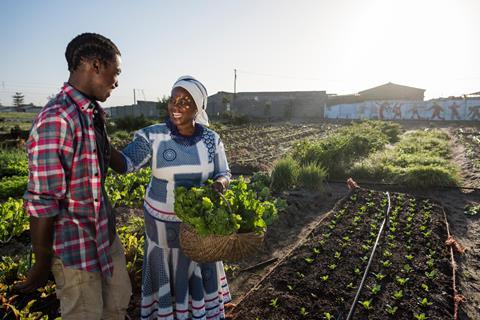Rome roundtable gathers farmers from Sub-Saharan Africa to discuss how a diverse set of practices and technologies can enhance productivity, soil health, biodiversity and more
Smallholder farmers in Africa benefit from regenerative agriculture through a diverse set of practices but need better access to technology.

This was the key outcome of the second Roundtable of African Farmers, which took place in Rome and was co-organised by the Pontifical Academy for Life, Bayer, Global Farmer Network, World Farmers’ Organization, African Agricultural Technology Foundation (AATF), and Inter-American Institute for Cooperation on Agriculture (IICA).
Sub-Saharan Famers from Ivory Coast, Lesotho, Mali, Nigeria, Kenya, Rwanda, South Africa, Uganda, and Zambia discussed with international policy-makers and other key stakeholders the importance of policies that enable smallholders to apply regenerative agricultural practices more broadly and to improve food security in Africa.
They called for governments to develop policies that promote an outcome-driven, technology-neutral, and evidence-based approach to agricultural solutions.
Bringing this together with enhanced farmer training and support for regenerative agricultural practices could be a big step towards more productivity while benefitting the environment, they noted.
This could be achieved through a diverse set of practices and technologies that combine modern and traditional tools tailored to the farmers’ specific needs.
Most importantly, farmers stated that there is was no one-size-fits-all solution to the endeavour.
“The vast majority of food in Africa is being produced by smallholder farmers. It’s important to listen to them and to learn about the big challenges they face in light of climate change,” said Debra Mallowah, head of Africa region for Bayer’s crop science division.
“We have heard today how many farmers are contributing to the socio-economic and environmental development of the Sub-Saharan region.
”The private sector, together with governments and policy makers, international organisations, research institutions, and civil society are to develop infrastructures, build capacity, carry out research and invest in innovations to create an enabling environment for those farmers to thrive and ultimately benefit all of us,” she said.
Barriers
Despite the proven benefits of diverse approaches, farmers highlighted the barriers they faced to access the tools they needed to fully realise the potential of regenerative agriculture.
Low public and private R&D investments, high upfront costs for modern technologies, limited access to insurance and credit policies and lack of infrastructure hindered many smallholder farmers, they outlined.
To promote regenerative agriculture, African farmers urged governments to revise policies, allowing access to diverse technologies tailored to farmers’ needs.
Financial institutions should, they said, offer low-interest loans, grants, and insurance products especially for smallholders, encouraging investment in modern technologies and sustainable practices.
According to the farmers, expanding education and training through demonstration farms, digital platforms, and extension services remained essential.
Furthermore, increased public and private investment in R&D, alongside collaboration between companies, farmers, and research institutions, was vital to developing region-specific solutions and make both traditional and innovative practices accessible and affordable.
Agriculture supports over 50 per cent of Africa’s population and contributes 35 per cent to its GDP, reaching up to 60 per cent in some countries.
Despite this, Africa faces rising food imports and persistent food insecurity due to low productivity, low value added per worker, and subsistence farming below efficient scales with an average farm size of 1.3ha.
Despite having 65 per cent of the remaining arable land of the world, only 10 per cent is utilised.
”For Bayer, regenerative agriculture is an outcome-based production model which has improving soil health at its core and strengthening resilience as a key objective,” the group stated.
”Other principal aims include mitigating climate change, maintaining or restoring biodiversity, conserving water as well as increasing yields and improving the economic and social well-being of farmers and their communities.”



